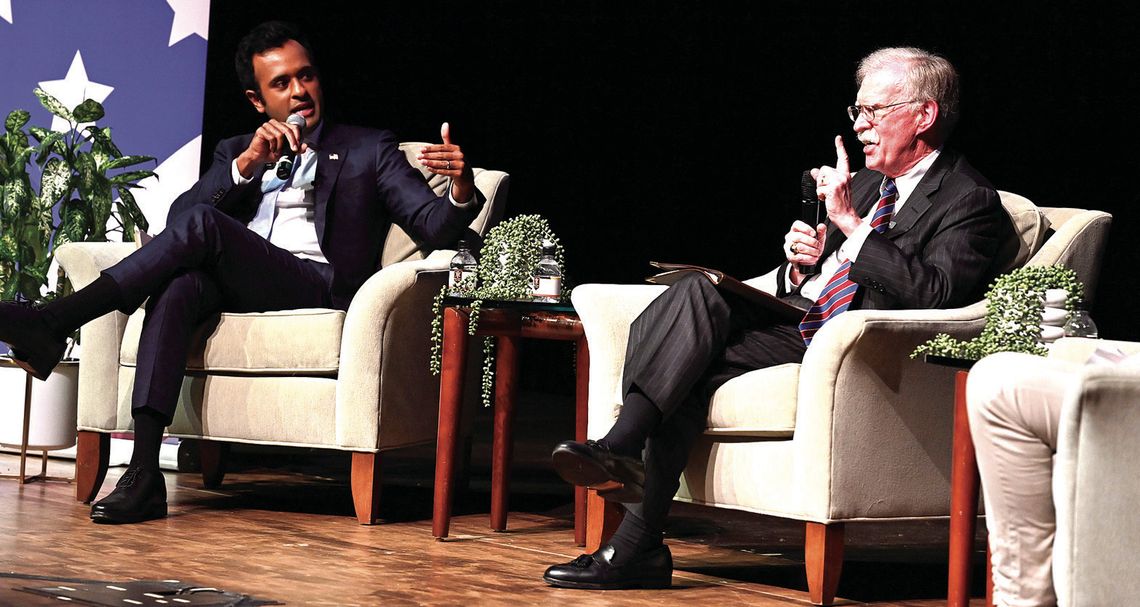Editor’s note: The following story was written by Marianne Hause, media relations specialist for VMI Communications & Marketing.
It was standing room only in Virginia Military Institute’s Gillis Theater Oct. 3 as John Bolton, former U.S. ambassador to the United Nations and former U.S. national security adviser, and Vivek Ramaswamy, former 2024 Republican U.S. presidential candidate and New York Times best-selling author, met for the first time in person.
They were there to debate as part of Steamboat Institute’s Campus Liberty Tour, co-hosted by VMI’s Center for Leadership and Ethics. The full capacity audience was a combination of cadets, faculty and staff, and members of the community.
The debate explored the resolution: “The U.S. should use its diplomatic and military power around the globe to ensure America’s national security.” Bolton argued the affirmative, while Ramaswamy argued the negative. It was moderated by Tom Rogan, a foreign policy/ national security writer for the Washington Examiner, and a Tony Blankley Senior Fellow at Steamboat Institute.
Each speaker gave an opening statement. In his, Bolton said that he is a very strong proponent of the resolution, and until recent years, it would have been considered common sense, and a reflection of American history.
“For a number of reasons, I think we’ve lost a real understanding of American national security,” he said. “The underlying cause for that was the victory in the Cold War won by the American-led alliance. With the collapse of the Soviet Union, and the dissolution of the Warsaw Pact, many people in the U.S., Europe, and around the world thought there would be no more global geopolitical confrontation. Economics would take care of everything. We had a peace dividend. Because there would be no more international conflict, we could cut defense budgets, and increase domestic welfare programs. The U.S. and Europe did exactly that, and we have lived to regret it.”
Bolton continued by stating that the lack of understanding of national security has led to the reemergence within the last five to 10 years of the concept of isolationism, which he believes is a problem that is growing worse.
“It rests on mythology about American history that there was a time when we were happily separate from the rest of the world, free from any involvement in their conflicts, happy to do our own thing,” he said. “Some people believe this idea has its historical roots in George Washington’s Farewell Address, where he talked about avoiding entangling alliances.
“I would make the argument that the U.S. has never been isolationist,” Bolton continued. “We have always been part of the wider world. We have had interests around the world from our beginning, and George Washington himself knew that better than anybody else. It is a fact that the U.S. would never have been independent were it not for French aid and military force, and then later, from Spain and the Netherlands. Washington’s Farewell Address was a very carefully thought-out legacy that Washington wanted to leave to tell this new and perilously weak nation to avoid getting involved in European conflicts where we didn’t have a real interest because he had a longer range vision, which we have now achieved.”
Ramaswamy used his opening remarks to state he thinks the path to truth runs through free speech and open debate, and the resolution is hard to disagree with as drafted.
“But I think the essence of what’s at stake is whether or not the U.S. has a role to play as global police, and the answer to that question for me is an absolute no,” he said.
Ramaswamy continued that he has no doubt that he and Bolton share the same goal for the U.S. foreign policy, to make it a stronger nation. Where they disagree is in how that goal is achieved.
“I appreciate Bolton’s reference to American history, but I’d like to refer to the history of the last 25 years, and the results of the interventionist foreign policy,” he said. “Let’s start with the wars in Iraq and Afghanistan. There’s the financial cost of $8 trillion on those two wars alone, and that doesn’t include other engagements in other parts of the world, including the recent Ukraine costs or other parts of the Middle East. That’s at a moment where our national debt is $34 trillion, well on our way to interest payments on our national debt being the largest line on our federal budget.
“But it’s not just the financial cost of those wars, of course, it’s the human cost,” he continued. “Nearly 7,000 to 8,000 American lives were lost, 53,000 were wounded, and 30,000 more deaths if you count the suicides after the wars. And if the financial and human costs weren’t persuasive enough, I would further add that the mass migration crisis in Europe today is actually, in part, a direct function of our failed intervention in the Middle East. We cannot, in good conscience, send America’s sons and daughters to go die in war if we haven’t identified what the objective of that war really is. The reason I’m against the resolution, as I see it, which is whether or not the U.S. should be the world’s global police, is the evidence suggests that we have failed miserably.”
The moderator asked questions, and allowed audience members — both in person and watching the livestream — to ask questions to the speakers on varying topics including the growing relationship between China and Russia, the Russo-Ukrainian war, the Israel-Hamas war, the current White House administration, and the upcoming election. The two orators answered the questions thoughtfully, sometimes heated, but mostly respectfully and civilly. They each gave brief closing statements The audience had the opportunity to record their stance on the debate topic in the pre- and post-debate polls. Prior to the debate, 65% agreed with the resolution, 19% disagreed, and 16% were undecided. After the debate, 41% agreed, 55% disagreed, and only 4% remained undecided.
Following the debate, the audience was invited to a brief reception in the Hall of Valor to meet Bolton and Ramaswamy.
The debate in its entirety may be viewed on YouTube by typing in “Vivek vs. Bolton: Should the U.S. Use Diplomatic & Military Power Globally for National Security?”
The Steamboat Institute Campus Liberty Tour continues through November with debates at the University of Texas at Austin, Oct. 9; Harvard University, Oct. 17; University of Maryland, Oct. 22; University of North Carolina at Chapel Hill, Oct. 30; and New College of Florida, Nov.14. All debates will be livestreamed. Additional information and how to register is available on Steamboat Institute’s website.

VMI CADETS react to a humorous comment during the debate last Thursdsay in Gillis Theater. (VMI photo by Kelly Nye)





